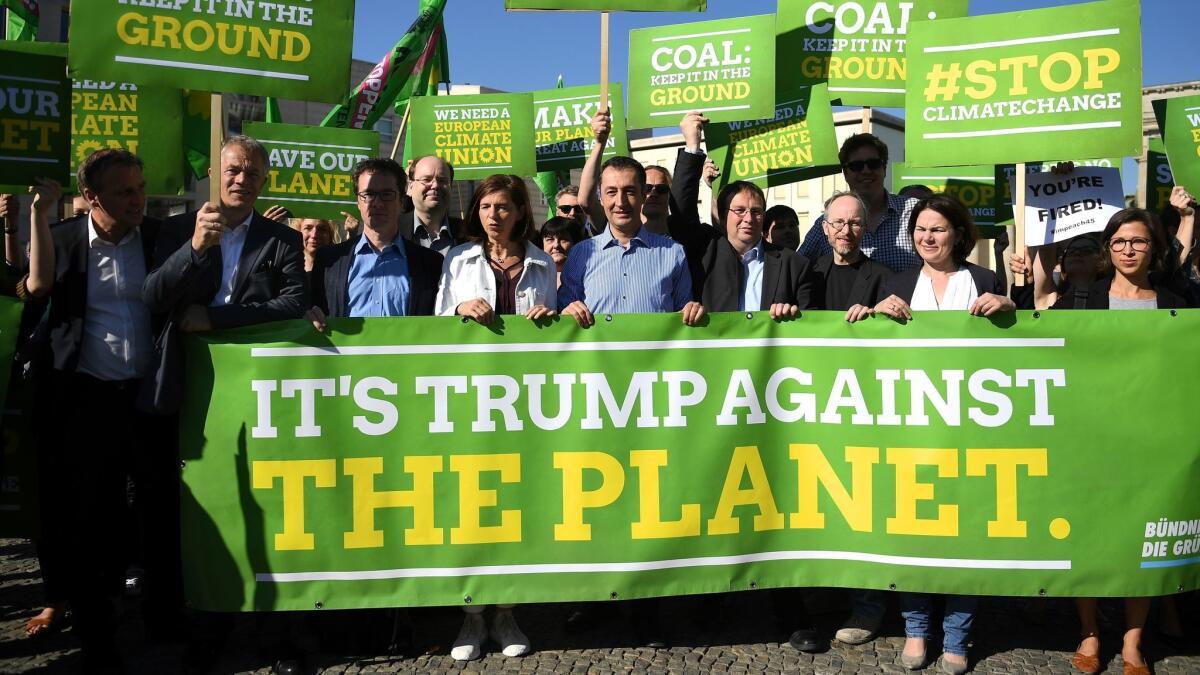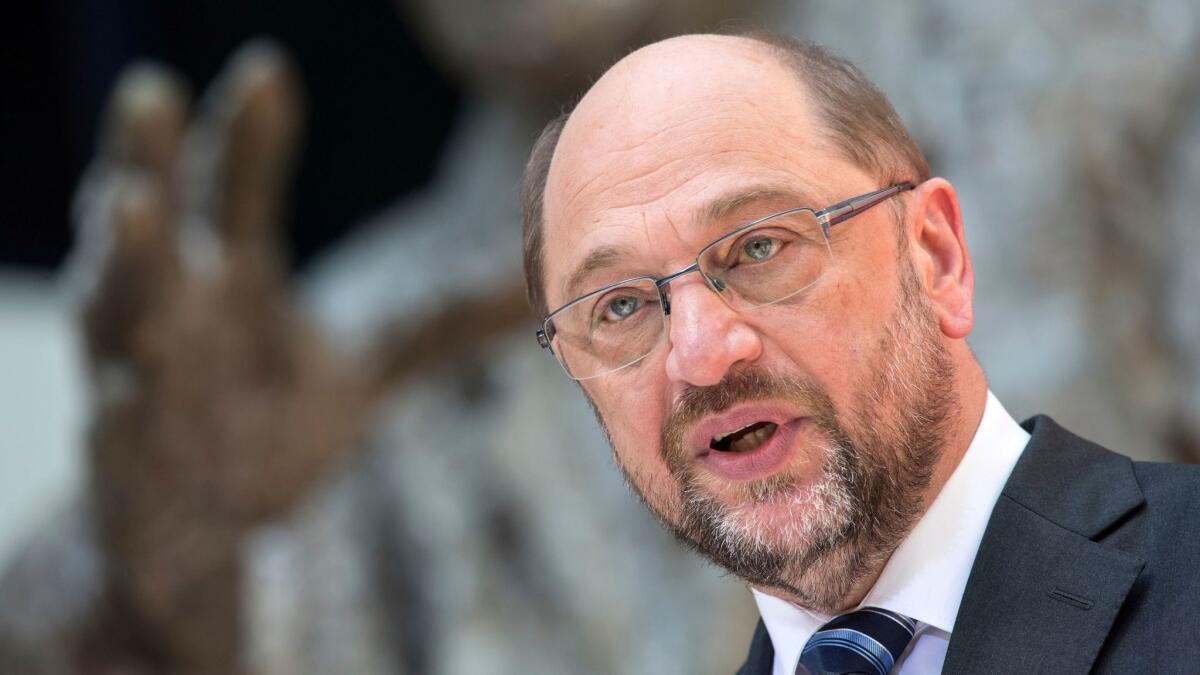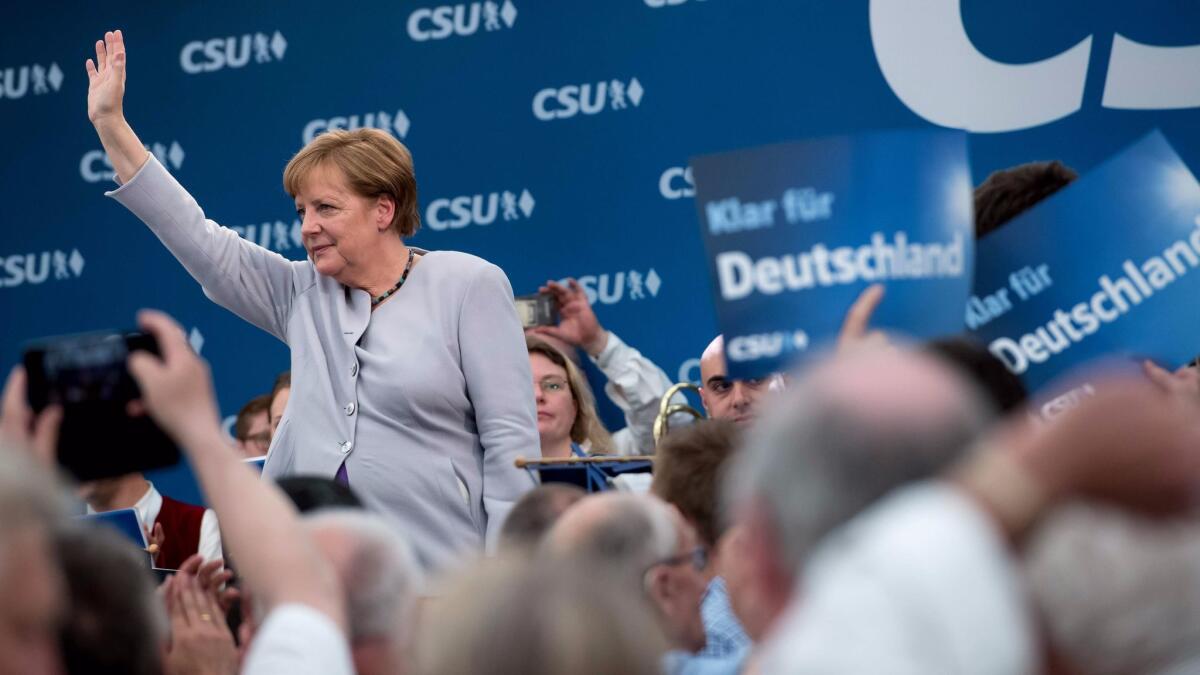Trump and his ‘America First’ policies have turned into a hot-button campaign issue in Germany’s election

Reporting from Berlin — A casual observer could be excused for thinking that there are three candidates in the election for German chancellor: Angela Merkel, Martin Schulz and Donald Trump.
And the last of those seems to be getting the most attention.
The U.S. president and his “America first” policies have turned into the hot-button campaign issue in Germany in advance of its Sept. 24 election, with increasingly critical comments coming both from Merkel, the conservative incumbent, and her center-left challenger, Schulz.
The Trump-bashing is striking in a country that has for decades considered itself one of the United States’ closest allies. But it reflects deep concerns throughout much of Europe over Trump’s foreign policy, especially his less-than-full-throated endorsement of NATO and his decision to back out of the Paris agreement on climate change.
That could be seen in recent days in France, where newly elected President Emmanuel Macron responded to Trump’s exit from the climate accord by issuing a video statement in English, calling on global leaders to “make our planet great again.” In Britain, Labor leader Jeremy Corbyn accused Prime Minister Theresa May of a “dereliction of duty” for merely expressing “disappointment” in Trump’s decision, rather than a stronger response.
But nowhere has reaction been stronger than in Germany, Trump’s ancestral homeland, where opinion polls suggest that more than 90% of the population disapproves of the American president. And now, the election campaign threatens to become a referendum of sorts on which candidate is most likely to stand up to Trump.

On Thursday, Schulz said that, if elected, he would renege on a promise made by Merkel in 2014 that Germany would work to nearly double its defense spending to the NATO-wide target of 2% of gross domestic product. Trump has complained that 23 of 28 North Atlantic Treaty Organization members, including Germany, fail to “contribute their fair share,” and has demanded that they begin doing so.
“I can’t understand how anyone could make such a promise,” Schulz said. “I’m not going to subject myself to the logic of the arms race that the United States is demanding.”
It was only the latest illustration of rising anti-Trump rhetoric from Schulz and leaders in his Social Democratic Party, or SPD, who are eager to tap into the prevailing disdain for Trump and a spreading anti-American sentiment.
Germany’s foreign minister, Sigmar Gabriel, said in a newspaper interview this week that Trump was “a danger to peace in Europe” because of his actions on climate change, arms sales and defense spending. The former SPD leader also criticized Trump for stirring religious tensions.
Political scientists — who note that shock in Europe over Trump’s brand of populism had some influence on the defeat of populists in elections in Austria, the Netherlands and France — said the SPD has turned up the anti-Trump volume in the hopes of rallying back in opinion polls for September’s election after falling behind Merkel’s Christian Democrats in recent months.
The strategy of attacking a U.S. president has worked before in Germany. The last SPD chancellor, Gerhard Schroeder, came from behind to win the 2002 race by loudly criticizing President George W. Bush and his plans to invade Iraq.
“Some are accusing me of endangering the German-American friendship. What kind of friendship is that if you’re not free to state your opinion but instead have to stand there and click your heels together?” Schroeder said at the time.
That earned him cheers at home but a period of frosty ostracism by the Bush administration.
“You can win an election in Germany if you campaign against a widely despised American president,” said Thomas Jaeger, a political scientist at Cologne University. “You can’t win by campaigning against the United States itself but can if you’re railing out against a president like Bush or Trump.”
Trump’s “American first” policies have played especially badly in Germany, with its aversion to war and authoritarianism after its 20th century history and its strong appetite for multilateral cooperation.
“Trump is playing such a significant role in the German election because all the disturbing things he’s been doing are seen as the antithesis of what so many here consider to be the right policies and behavior,” said Hans Vorlaender, a political scientist at Dresden’s Technical University. “Trump is the bogeyman right now. He’s the bad guy against the good guys. He’s wonderful for the campaign and helping to mobilize voters.”
An opinion poll by ZDF public TV on Friday showed that 68% of Germans view German-American relations as in “bad shape” right now, a record high compared with 14% in October 2016, just before Trump’s election. It found that 79% are worried that Trump is a danger for international cooperation on issues such as climate change, counter-terrorism efforts and refugees.

Manfred Guellner, the managing director of the Forsa polling institute, predicted that Merkel would gain more from the anti-Trump mood than her rival, Schulz. “In times of global crises, like with Trump, Merkel will benefit. She’s seen as the best-suited to watch out for them. She’s their protective umbrella against Trump,” he said.
Merkel, who spent the last six months trying to connect with the Trump administration, surprised many last Sunday when she, too, spoke critically about Trump and his refusal at the Group of 7 meeting in Italy to back the fight against climate change. She told a beer-tent campaign rally in Bavaria that the United States no longer was a reliable ally. She later criticized Trump’s decision to pull the U.S. out of the Paris climate agreement.
“It was important for Merkel that she was out there first speaking out against Trump,” said Vorlaender, noting that her speech was aimed primarily at German voters rather than policymakers in the U.S.
Some ordinary Germans agreed that it was important for Merkel to distance herself from Trump after seeming to try hard to win his favor and confidence. Merkel had said that she had a “good working relationship” with Trump and had invited his daughter Ivanka to a panel discussion in Berlin in April.
“It would have really been bad for Merkel if she didn’t speak out like she did against Trump,” said Gunda Bayer, 44, a business administrator in Berlin. “She had to do that. I think it’s unfortunate that we’re having to worry so much about what’s going on in the United States in our election. It’s messed up.”
Jann Hamman, 39, a security guard, said that Schulz and Merkel were striking the right chord by speaking out against Trump and his policies.
“There’s nothing good about what he’s doing,” he said. “No one in Germany likes Trump. No one.”
Kirschbaum is a special correspondent. Special correspondent Kim Willsher in Paris contributed to this report.
ALSO
Trump’s ‘America first’ policy changes U.S. role on global stage
Europe’s reaction to the Trump style ranges from envy to ‘you tiny, tiny, tiny little man’
More to Read
Sign up for Essential California
The most important California stories and recommendations in your inbox every morning.
You may occasionally receive promotional content from the Los Angeles Times.










